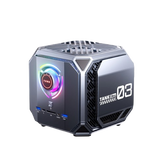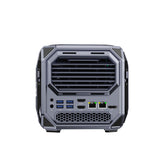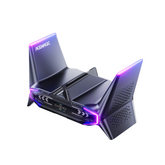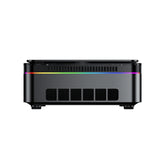AMD Ryzen 7 vs Intel i5: Which CPU is Better for you?

When choosing a high-performance computer, the processor (CPU) is a crucial component that determines speed and responsiveness. Whether it’s for multitasking, smooth gaming, or complex content creation, CPU performance directly impacts the overall experience.
In the CPU market, AMD and Intel are two dominant giants, consistently driving innovation in the industry. Over decades of fierce competition, they have released a range of powerful processors, providing consumers with plenty of options. However, when comparing similarly priced options—especially AMD Ryzen 7 vs Intel Core i5—many users may find it challenging to decide which is better suited to their needs.
In this article, we will focus on comparing two popular processors with similar price points: the AMD Ryzen 7 5800X and the Intel Core i5-12600K. While these CPUs target slightly different users, they both appeal to gamers and content creators alike. So, in the battle of AMD Ryzen 7 vs Intel Core i5, which one is right for you? Let's dive into a detailed comparison to help you make an informed choice.
Introduction to AMD Ryzen 7 5800X
The Ryzen 7 5800X is a high-end processor based on the Zen 3 architecture, featuring 8 cores and 16 threads. It is suitable for handling a variety of multitasking scenarios, from gaming to video rendering. With its IPC improvements and enhanced power efficiency management, it offers exceptional performance for content creators and heavy multitaskers, while also being popular among tech enthusiasts.

Introduction to Intel Core i5-12600K
The Intel i5-12600K is built on the Alder Lake architecture, combining 6 performance cores (P-core) and 4 efficiency cores (E-core) , for a total of 10 cores and 16 threads. Its strong single-core performance makes it an ideal choice for gamers, while the multi-core design also provides solid productivity performance under heavy workloads. Thanks to its innovative hybrid architecture, it excels in task allocation and performance efficiency.

Specification Comparison
Below is a specification comparison table for the AMD Ryzen 7 5800X and the Intel Core i5-12600K. It highlights the core specifications and features of these two processors, helping you to better understand the differences between them:
| Specification | AMD Ryzen 7 5800X | Intel Core i5-12600K |
|---|---|---|
| Architecture | Zen 3 | Alder Lake |
| Cores | 8 cores | 10 cores (6 P-core + 4 E-core) |
| Threads | 16 threads | 16 threads |
| Base Clock | 3.8 GHz |
|
| Max Boost Clock | 4.7 GHz |
|
| Cache |
|
|
| TDP | 105W | 125W (Base), max 150W |
| Process Technology | 7nm | Intel 7 (10nm Enhanced SuperFin) |
| Unlocked for Overclocking | Yes | Yes |
| Socket | AM4 | LGA 1700 |
| Memory Support | DDR4 (up to 3200 MHz) | DDR5 (4800 MHz) / DDR4 (3200 MHz) |
| PCIe Support | PCIe 4.0 | PCIe 5.0 and PCIe 4.0 |
| Thermal Solution | Requires separate purchase | Requires separate purchase |
| Market Segment | Multitasking / Content Creation | Gamers / General Use |
| Release Date | November 2020 | November 2021 |
Cores and Threads
The AMD Ryzen 7 5800X is equipped with 8 high-performance cores, each supporting Simultaneous Multithreading (SMT) , resulting in a total of 16 threads. This symmetrical multi-core design excels in demanding tasks requiring high parallelization, such as video editing, 3D rendering, and multitasking. In such scenarios, all cores can operate efficiently together, maximizing performance across multiple workloads.
On the other hand, the Intel Core i5-12600K features Intel’s Alder Lake hybrid architecture, with 6 performance cores (P-cores) and 4 efficiency cores (E-cores) , also offering 16 threads. The advantage of this hybrid design lies in its ability to intelligently distribute tasks: the P-cores handle demanding applications like gaming and graphic processing, while the E-cores manage lighter, background tasks such as system maintenance, thereby optimizing power consumption and ensuring system responsiveness. This design not only enhances single-core performance but also reduces power usage during lighter workloads.
Frequency Performance
The AMD Ryzen 7 5800X has a base clock of 3.8 GHz and a maximum boost clock of 4.7 GHz. This relatively high base and boost frequency, combined with its 8 cores and 16 threads, makes it excellent for multitasking and productivity tasks, such as video editing and data rendering. While its maximum frequency is slightly lower than that of the i5-12600K, the symmetrical high-performance core design allows it to handle multiple tasks in parallel effectively, maintaining a high processing speed.
In contrast, the Intel Core i5-12600K features a tiered frequency design. Its P-core (performance core) has a base clock of 3.7 GHz, slightly lower than the Ryzen 7 5800X. However, its single-core maximum boost clock can reach 4.9 GHz, surpassing Ryzen’s max boost. This gives the i5-12600K a clear advantage in applications where high single-core performance is crucial, such as most games and mainstream office applications. On the other hand, the E-cores (efficiency cores) have a base clock of 2.8 GHz and a maximum boost clock of 3.6 GHz, primarily designed for handling lighter tasks, optimizing power consumption and improving energy efficiency.
Cache
The AMD Ryzen 7 5800X is equipped with 32 MB of L3 cache, which is one of its key advantages. A larger L3 cache significantly enhances fluidity when handling complex, multi-threaded tasks, especially in scenarios involving heavy data processing, graphics rendering, or virtualization. It effectively reduces performance bottlenecks caused by cache misses when the processor needs to quickly retrieve data from the cache. The larger L3 cache minimizes the need to access slower DRAM, improving the overall continuity of performance. This is particularly beneficial for content creators or users running data-intensive applications, resulting in better work efficiency.
The Intel Core i5-12600K, on the other hand, comes with 20 MB of L3 cache. Although it has 12 MB less L3 cache than the Ryzen 7, it compensates with a more advanced and efficient tiered cache system. In the i5-12600K’s architecture, while the L3 cache is smaller, it more than makes up for it with its 9.5 MB of L2 cache, which is larger than Ryzen 7’s L2 cache. Thanks to the larger L2 cache, the Intel i5-12600K can rapidly manage data across multiple tasks, especially when paired with the P-core and E-core for intelligent task allocation. The faster L2 cache access significantly reduces data retrieval times, and although the L3 cache is smaller, it helps bridge some of the performance gaps.
AMD Ryzen 7 vs Intel i5: Single-Core and Multi-Core Benchmark Comparison
Based on UserBenchmark test data, we can see that the Intel Core i5-12600K outperforms the AMD Ryzen 7 5800X across different core configurations. Below are the benchmark scores and analysis:
| Core Count | Intel Core i5-12600K Score | AMD Ryzen 7 5800X Score | Intel vs AMD Improvement |
|---|---|---|---|
| Single-Core (1-Core) | 194 Pts | 166 Pts | +17% Faster Single-Core |
| Dual-Core (2-Core) | 382 Pts | 324 Pts | +18% Faster Dual-Core |
| Quad-Core (4-Core) | 736 Pts | 613 Pts | +20% Faster Quad-Core |
| Octa-Core (8-Core) | 1223 Pts | 1068 Pts | +15% Faster Octa-Core |
In the single-core comparison, the Intel Core i5-12600K holds a clear advantage, scoring 194 points, which is 17% higher than the AMD Ryzen 7 5800X's score of 166 points. This gives the i5-12600K a significant edge in gaming and single-threaded tasks. For modern gamers, single-core performance is particularly important since many games still rely heavily on high-frequency single-core processing, directly affecting frame rates.
When it comes to multi-core performance, from 2-core to 8-core configurations, the Intel i5-12600K also demonstrates superior multi-core processing capabilities. In the dual-core score, the i5-12600K leads by 18% , highlighting its better performance for smaller, dual-threaded workloads (such as light office applications and some image processing tasks). As the core count increases, Intel further extends its lead in the quad-core and octa-core tests, with improvements of 20% and 15% respectively. This is particularly noticeable in complex multi-threaded tasks like video encoding, 3D rendering, and compiling, where the hybrid architecture of the i5-12600K excels at efficiently managing large workloads. Although the Ryzen 7 5800X features 8 balanced high-performance cores, Intel's P-cores offer more effective performance distribution.
AMD Ryzen 7 vs Intel i5: Overclocking Comparison
Overclocking refers to manually adjusting the processor’s parameters to increase frequency, unlocking its potential performance. Both the AMD Ryzen 7 5800X and Intel Core i5-12600K support manual overclocking, but their performance differs in actual use.
| Core Count | Intel Core i5-12600K OC Score | AMD Ryzen 7 5800X OC Score | Intel Performance Gain |
|---|---|---|---|
| Single-Core OC | 207 | 179 | +16% Faster Single-Core OC |
| Dual-Core OC | 416 | 357 | +17% Faster Dual-Core OC |
| Quad-Core OC | 813 | 693 | +17% Faster Quad-Core OC |
| Eight-Core OC | 1367 | 1328 | +3% Slightly Faster 8-Core OC |
Based on UserBenchmark test data, in terms of overclocking performance, the Intel Core i5-12600K holds a clear advantage. In single-core overclocking, the i5-12600K outperforms the AMD Ryzen 7 5800X by 16% , which is particularly beneficial for gaming and single-threaded applications. The higher clock speeds result in smoother performance and higher FPS in these scenarios.
For dual-core and quad-core overclocking, Intel leads by 17% , demonstrating its potential for overclocking in small-scale multi-core tasks and rendering jobs. This makes it ideal for high-end gaming and tasks requiring small-scale parallel processing. While Intel's lead narrows to 3% in eight-core overclocking, it still retains a slight edge.
However, as the gap narrows in the eight-core overclocking scenario, AMD Ryzen 7 5800X's lower power consumption gives it an advantage in long-running multi-threaded tasks. So, while the i5-12600K shines in short, high-performance tasks, the Ryzen 7 5800X remains a more balanced choice for users focused on sustained, multi-threaded workloads, especially when balancing performance and energy efficiency is critical.
AMD Ryzen 7 vs Intel i5: Power Consumption Comparison
While the Intel Core i5-12600K excels in performance, especially in single-core and overclocking tests, this comes with a significant trade-off—higher power consumption and cooling demands. The i5-12600K has a base TDP of 125W, but when running at maximum turbo frequencies, its power consumption can exceed 150W. For long-duration workloads, intense gaming, or overclocking scenarios, this means the processor generates more heat, requiring a high-performance cooler to maintain system stability. Though the performance is strong, the increased power usage and noise may be factors to consider.
In contrast, the AMD Ryzen 7 5800X has a TDP of only 105W, making it more power-efficient. Even during extended full-load sessions, its heat management is more consistent, thanks to AMD’s 7nm process technology, which allows it to deliver strong performance while keeping power consumption lower. This makes the 5800X particularly efficient in multi-threaded tasks or content creation workloads. However, its overclocking potential is lower than the i5, meaning you won’t experience the same power spikes, but it falls slightly behind in high-frequency gaming and heavy-load tasks.
How to Choose Between Intel Core i5-12600K and AMD Ryzen 7 5800X?
If you're a gamer or someone with a high demand for single-core performance, the Intel Core i5-12600K is a more ideal choice. This processor excels in single-core performance and overclocking capabilities, making it especially impressive for gaming or high-frequency applications like programming and design software. While its power consumption and heat output are relatively high, if you're willing to invest in better cooling solutions, the i5-12600K can deliver smooth and stable high-performance results.
On the other hand, if your focus is on multi-threaded tasks like video editing, 3D rendering, or other compute-heavy operations that run for extended periods, the AMD Ryzen 7 5800X might be a better option. While it falls slightly behind Intel in terms of overclocking and single-core performance, it remains highly efficient in handling multi-threaded workloads. Its lower power consumption makes it better suited for high-load, longer-running tasks, especially for users who need to balance efficiency and thermal management.
Conclusion
In summary, both the AMD Ryzen 7 5800X and the Intel Core i5-12600K are highly competitive processors with excellent price-to-performance ratios. The key to choosing between them lies in understanding your specific use case and prioritizing what's most important for your needs.
Whether you value multi-threaded performance or single-core speeds and overclocking, each processor caters to different types of users. For those focused on gaming and high-frequency tasks, Intel i5 offers impressive capabilities, while AMD Ryzen 7 excels in multi-threaded workloads with greater energy efficiency.
Read More
Amd Ryzen 5 vs Intel i5: Differences & How to Choose
Intel Celeron Processor vs Pentium: Key Differences and Best Use Cases
Ryzen 7 5700X vs. Ryzen 5 5600X: Choose the Best Processor For you
FAQ
1. Is AMD Ryzen 7 better than Core i5?
It depends on your use case. Ryzen 7 5800X excels in multi-threaded performance, making it ideal for tasks like video editing and 3D rendering. However, the Intel Core i5-12600K delivers stronger single-core performance and overclocking potential, making it better for gaming and single-threaded applications.
2. Intel i5 or Ryzen 7, which is better for gaming?
For gaming, the Intel Core i5-12600K is generally the better choice, thanks to its superior single-core speeds and higher clock frequencies. These factors often result in better FPS in most games. While Ryzen 7 5800X can still handle modern games well, it shines most in multi-threaded tasks.
3. What is Ryzen 7 best for?
Ryzen 7 is best for multi-threaded workloads, such as video editing, 3D rendering, and other tasks that require multiple cores running in parallel. It's an excellent choice for content creators or those needing efficient performance in demanding applications.
4. Is it worth buying a Ryzen 7 over an Intel Core i5?
It’s worth buying Ryzen 7 if you focus on multi-core performance for tasks like rendering, video editing, or heavy multitasking. However, if you primarily need a CPU for gaming or single-core focused applications, Intel i5 may provide better value.







Leave a comment
Please note, comments need to be approved before they are published.